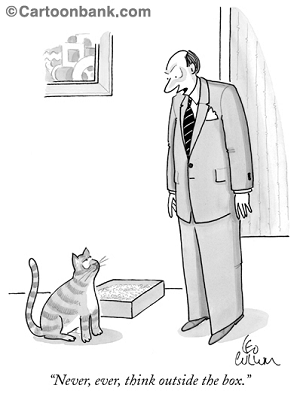 Nothing is quite as distressing for an owner as having a cat that urinates or defecates around the house instead of in its litterbox. As long suffering as some owners are, there’s a limit to the amount of time some of them can, or will, put up with living in a house that smells like a feline latrine.
Nothing is quite as distressing for an owner as having a cat that urinates or defecates around the house instead of in its litterbox. As long suffering as some owners are, there’s a limit to the amount of time some of them can, or will, put up with living in a house that smells like a feline latrine.
Sad but true, “inappropriate” urination, as it is euphemistically called, is responsible for the annual relinquishment of many cats to shelters and pounds, which is often the equivalent of a death sentence. The tragedy is that the vast majority of problems of this nature are easily fixed if the cause is determined and appropriate measures are taken.
The Causes
• Medical Causes of Inappropriate Elimination
• Hormonal Causes
• House Soiling Problems (aka. Litterbox problems).
Although technically all elimination problems are “house soiling problems,” this term tends to be reserved for litterbox problems (i.e. conditions in which the cat simply chooses not to use the litter box for any one of a variety of reasons and selects an alternative location to eliminate urine, feces, or both).
Typically, the cat refuses to use its litter box for one or both functions and instead selects a quiet, carpet-clad spot behind a chair or “goes” on a throw rug. This behavior is not a problem for the cat, only the owner.
Reasons why cats dislike their litterbox facilities are as follows:
• Too few boxes
• Inappropriately positioned boxes (in a damp cellar, in a high traffic area of the home, next to a washing machine or dryer)
• Hooded box (many cats dislike hoods)
• Presence of box liners (some cats are intimidated by plastic liners)
• Plastic underlay (convenient for the owner but not by the cat)
• Box too dirty (not scooped often enough)
• Box too clean (cleaned with harsh smelling chemicals or perfumed soaps)
• Unappreciated (wrong) type of litter
• Litter pan not filled deep enough
• Animosity between cats in the house (competition/guarding of litter boxes)
• Difficulty getting into/out of the box. Especially likely in elderly, arthritic cats.
Conclusion
While inappropriate urination literally used to be a killer of a problem that vets found extremely difficult to treat, clinical knowledge has increased to the point where no cat need loose its life as a result of this state of affairs.
Medical problems can largely be addressed or contained. Litter box problems are easily fixed. Even the anxiety-based problems can now be treated thanks to modern medicine and a better understanding of their cause.
Click here to read the complete article.
Dr. Dodman is a Professor in the Department of Clinical Sciences at Cummings School of Veterinary Medicine and Director of the school’s Animal Behavior Clinic. He is also Chief Scientific Officer for the CENTER FOR CANINE BEHAVIOR STUDIES. He has written over 100 scientific articles and several popular press books, including The Dog Who Loved Too Much and The Cat Who Cried for Help.

